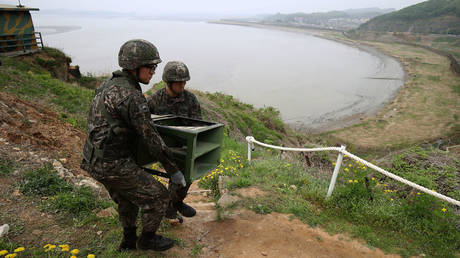
Seoul and Pyongyang have recently stopped propaganda broadcasts as part of a thaw in relations
South Korea has begun dismantling loudspeakers along the border with North Korea, Yonhap News Agency reported on Monday, citing the country’s Defense Ministry. The move comes weeks after both sides agreed to halt propaganda broadcasts as part of a broader effort to ease tensions on the peninsula.
Removing the equipment reflects a broader diplomatic shift under South Korea’s new president, Lee Jae-myung, who has signaled an intention to reduce friction with Pyongyang. Despite signs of improvement, the two Koreas technically remain at war, as the 1953 armistice was never replaced by a formal peace treaty.
“It is a practical measure that can help ease inter-Korean tensions without affecting the military’s readiness posture,” the ministry said.
Large-scale loudspeaker arrays, installed by Seoul decades ago, were periodically used to blare K-pop music, news bulletins, and anti-regime messages across the Demilitarized Zone separating the two Koreas. Pyongyang often responded with its own broadcasts or by sending balloons filled with propaganda leaflets and bags of trash over the border, drawing protests from the South.
Relations between the two countries sharply deteriorated under the previous South Korean administration. In July 2024, Seoul resumed the loudspeaker campaign after a six-year pause, in response to Pyongyang’s launch of trash-filled balloons into the South. The tensions were sparked in part by North Korean anger over leaflets sent by defectors in the South.
At the same time, Seoul continued to bolster military preparedness by conducting joint drills with the US. Pyongyang condemned the exercises as rehearsals for invasion and responded with a series of missile tests.
Despite recent signs of renewed diplomacy, the South still maintains a defensive posture toward the North. Last week, South Korean Foreign Minister Cho Hyun and his US counterpart, Marco Rubio, reiterated their commitment to the denuclearization of North Korea, suggesting that dialogue remains a priority for regional stability.




